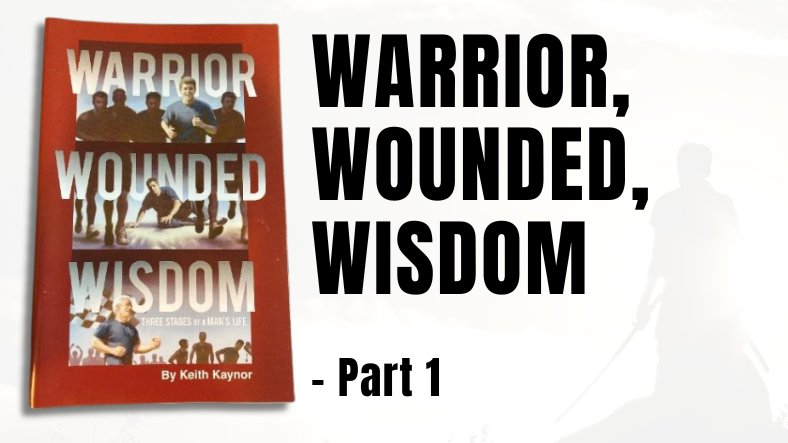Some years ago, I came across Robert Hicks’ book The Masculine Journey. In this book, he outlines a pattern of phases in life many men (and some women) experience. I was fascinated by his idea, since it described so well what I have observed and experienced. It gave me a new perspective of how God molds some men to be like His Son via different phases of a masculine journey.
Hicks suggests that there is a warrior phase to a male’s life (about 15-40 years of age), then a period of woundedness may follow (some where in the 30-60 period of life), and lastly, hopefully, a man enters a wisdom phase (60+) before being promoted into God’s presence. While Hicks has six stages, I have reduced them to these three.
This warrior, wounded, wisdom pattern does fit a number of men in the Bible and some men you know. Does it fit you?
Let’s look at this pattern again, adding more detail.
A man’s life may begin with a warrior period. These are the I-can-do-anything, no-fear years. The healthy, active, athletic years. Finish school, get a job, get married, buy a home, start a family and/or a business, launch an adventure. Grand years of expansion. In the lives of some men, a wounded period follows. A life-dominating problem engulfs the I-can-do-anything men and they struggle. Suddenly their lives do not make sense. God seems silent. Far away. Uninvolved..
These men wonder:
- Why was I rejected?
- Why did my court case take three years?
- Why did she leave me?
- Why did I get fired?
- Lord, will I ever get healthy again?
Such men may get angry, stop trusting God and drop out of church. They feel betrayed. Life is not turning out as expected.
But others – who have suffered just as much injustice, hardship and/or disaster – emerge into the Sonshine of a deeper relationship with the Almighty. God brings such a person into a wisdom period. It is here that a man builds a spiritual legacy for his adult sons and daughters and grandchildren, achieves more than in the warrior years, and brings positive attention to the Lord Jesus Christ.
I wanted to write this booklet to further explore and develop Hicks’ idea, in hopes that if men see their wounding experience from God’s perspective, they are more apt to escape paralyzing bitterness, trust God through it and emerge out the other side into the freedom and productivity of the wisdom stage.
Since some women go through the same stages, ladies may recognize themselves in this booklet as well.
Jesus Christ is the model of manhood we want to follow. He is our pattern. We want to be like Jesus.
Men, our masculinity is a gift from the Creator. Let’s revel in it. Develop it. Discipline it! And submit it to its Creator.
Different phases of life are indirectly acknowledged in I John 2:12-14: “I write to you dear children . . . I write to you fathers . . . I write to you young men …” Proverbs 20:29 says young men are strong while old men are wise. Generally we don’t expect to find warrior strength in old men, nor mature wisdom from young men. Each stage is a point on the masculine journey; each valuable to God. Let’s examine these stages – warrior, wounded and wisdom – of the masculine journey.
The first stage is the warrior. Gibbor, the Hebrew word for warrior, speaks of the male in his youthful strength, about 15 – 40 years of age.

God describes Himself as a Warrior in the following Bible verses:
- Jeremiah 10:6 “There is no One like You, O Lord; You are great, and great is Your name in might [gibbor].”
- Psalm 89:13 & 14 describe God as a Warrior who fights
for righteousness, justice, loving kindness and truth.
- Isaiah 9:6 “…for unto us a child is born, a son is given . . .
he shall be called wonderful counselor, mighty
[gibbor] God, prince of peace.”
Man is described as a warrior in the following verses:
- Real gibborness, according to Jeremiah 9:23 & 24, is
shown by knowing and understanding God.
- Psalm 40:4 “Blessed is the man [gibbor] who has made the Lord his trust.”
- Psalms 127:4 The ultimate spiritual reward for the
gibbor is not the honors, trophies, awards or money
he may gain, but the children God gives him.
- According to Isaiah 30:15, gibbor strength lies in repentance, resting in one’s salvation, and quiet trust in God.
The Biblical warrior does not primarily serve himself. He serves others and he is a servant of the Lord Jesus Christ. This is different than just being tough or strong. Different from being determined to always be right and win.
Warriorness is a quality that enables a man to go off to work for 40 years to provide for his family and continue working on a problem
until it is solved. Holy Spirit-controlled warriors are a great asset to the kingdom of God.
When we were boys we were told, “You are such a big boy,” or “You are such a smart boy.” We enjoyed such flattery, convinced such people were right. Affirmed as big, strong and smart, we males set off to conquer the academic or athletic world. We were athlete-scholar warriors, warring on the baseball diamond, basketball court; the classroom and factory to be the fastest, biggest, smartest, toughest, richest, strongest or any other est we sinners can dream up.
Boys and young men, we have been fed an inflated sense of our own value. People have exaggerated our good points. So we set off to conquer the world at 18 years of age. We set off to be warriors.
War seems glorious and exciting with its uniforms, parades and conquest! We will certainly win because we are such big boys. This is how God has wired males.
Describing his own warrior mindset, Glenn Ripley says he:
- Was in his glory years
- Enjoyed being a leader; feeling in demand
- Felt invincible
- Felt sorry for the wounded, but never expected to be wounded himself
- Was full of “spiritual testosterone”
- Was always searching for other warriors with little interest in or patience with those on the sidelines
- Dismissed anyone who left the battlefield for any reason
- Had little time for the wounded (or the ex-wounded) because he was in the thick of the battle. His calling was the battlefield, not the recovery ward.
- Realized he might get injured eventually, but didn’t expect an injury would take him completely out of the battle. Expected, rather, at worst to win a spiritual Purple Heart and keep on fighting.
The swagger in the step of a hard-core warrior announces, “I am going to make it – with you or without you. With you would be nice, but if you don’t join up with me, get out of the way. Because I am definitely getting the job done.” A warrior anticipates seeing his name in print, maybe even in lights. Pride does not run in his life, it gallops. Early servings of success, money, and/or influence convince him he is the invincible, complete package. Such is life in the community of Warriorville — the few, the brave, the proud.
Warriorness is celebrated in songs, poems and stories, focusing on bravery, stamina, self-reliance and self-sacrifice. With the exception of sinful skin magazines, many American male periodicals are built around warriorness. Field & Stream, for example, holds up the ideal of self-reliant, independent individuality. It conveys, “I can go out in the wilderness and carve out for myself a comfortable life. I can leave the office rat race, the politics and all the maneuvering. I will answer to no one and make it on my own. That’s the pure life, the good life – on my own!” It is this quality of self-reliance that enables a man to survive in the work-a-day world. The world can be brutal. Earning a living is exhausting. God has wired men with enough warrior determination to bring home a paycheck.
Warrior self-reliantly makes a man feel most alive, most needed and most a part of something important.


Recent Comments